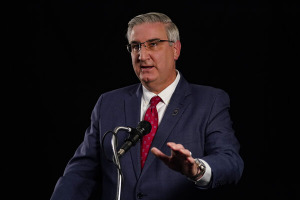Most Americans could file their taxes for free, but don’t
The GAO report, issued Thursday, found that while 70% of taxpayers were eligible for the Internal Revenue Service’s free-filing program, only 3% of taxpayers actually use the service.
The GAO report, issued Thursday, found that while 70% of taxpayers were eligible for the Internal Revenue Service’s free-filing program, only 3% of taxpayers actually use the service.
Monday is Tax Day—the federal deadline for individual tax filing and payments. About 40% of this year’s taxpayers still haven’t filed a return.
Hoosiers should expect to start receiving a $125 automatic taxpayer refund in May, Indiana Gov. Eric Holcomb announced Wednesday.

The plan would cut the income tax rate to 3.15% from 3.23% for 2023, which would amount to a $40 savings for those with $50,000 in taxable income. The tax rate would be cut further in 2025, 2027 and 2029, but only if state tax revenue grows by at least 2% in the previous budget year.

The tax cut package was a major remaining issue as the Republican-dominated Legislature looked to possibly finish this year’s session on Tuesday.

Republicans in the Indiana House passed their $1 billion individual income and business tax-cut proposal Thursday on a 68-25 party-line vote, sending it to the Senate, where its future is murky.
Republicans on the Indiana House Ways and Means Committee passed their $1 billion tax-cut proposal Wednesday night on a 15-7 party-line vote, sending it to the full House for consideration.
The Indiana Senate’s top Republican said tax cuts and limits on employer vaccine mandates didn’t land on his priority list because they are “controversial” and “more complicated to work through.” But that won’t stop House Republicans from pursuing them.
The plan proposes lowering or eliminating four separate taxes on sales, business personal property, individual income and utility receipts.

Indiana House Speaker Todd Huston says the state’s burgeoning surplus, forecast to grow to $5.1 billion by the end of June, gives him even more reason to pursue tax cuts.
The size of the state surplus has triggered Indiana’s automatic tax-refund law, with an estimated $545 million being divided evenly among 4.3 million taxpayers.
Year-end 2021 tax- and estate-planning efforts are being influenced by proposed tax law changes, the lingering pandemic, the threat of inflation and general economic uncertainty
We’re sure the progressives will assure us they are only proposing going after billionaires and other fat cats who are able to pay.

The clock is ticking for officials to decide whether they’ll raise local income taxes to pay for a $45 million to $50 million jail expansion and justice center to alleviate overcrowding.

A bill introduced last month in the U.S. Senate would add rules about how quickly donor-advised funds must distribute money to charity, but critics say the rules are unnecessary and could have the unintended consequence of hurting charitable giving.
The number of donor-advised funds in the United States, the amount contributed to these funds and the amount distributed to charity from them have all seen significant growth, with no signs of a slowdown.
The IRS announced the decision Wednesday and said it would provide further guidance in the coming days. The move provides more breathing room for taxpayers and the IRS alike to cope with changes brought on by the pandemic.

The three candidates answered questions Tuesday night about education, economic development and the role of government, but spent little time discussing the ongoing COVID-19 pandemic.
Special legislation passed in 2019 that caps Carmel’s income tax revenue growth at 2.5% per year for three years, with any excess transferred to Fishers, was triggered in the first year it could apply.
U.S. tax law has long been kind to big real estate developers. It allows them myriad legal loopholes and breaks that can significantly shrink their tax bills.